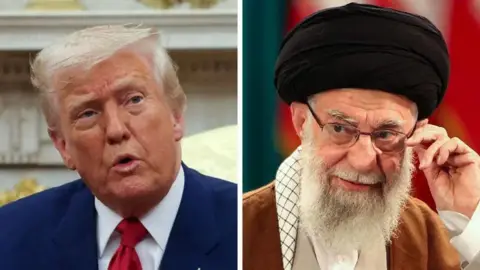### Postponement of Iran-US Nuclear Talks
The anticipated fourth round of negotiations concerning Iran’s nuclear program between the United States and Iran has been postponed, raising questions about the future of diplomatic relations between the two nations. In a recent announcement, Iranian officials disclosed that the meeting scheduled for Saturday in Rome was delayed due to “logistical and technical reasons.” This decision was reached jointly with facilitation from Oman. While the US government confirmed that the timing for the talks had not been established earlier, the postponement still adds a layer of complexity to the ongoing discussions.
### Growing Tensions Amid Diplomacy
This postponement occurs against a backdrop of escalating tensions, particularly highlighted by US President Donald Trump’s recent threats regarding Iranian oil purchases. On Thursday, Trump issued a stern warning stating that any entity engaging in the buying of Iranian oil or petrochemicals would face immediate repercussions in the form of secondary sanctions. This follows a series of recently imposed sanctions targeting multiple companies for purported ties to Tehran’s operations—a move that many view as part of Trump’s broader “maximum pressure” campaign against Iran.
In 2018, Trump exited the prior nuclear agreement involving Iran and five other nations, advocating instead for a “better deal” that aligns more closely with American interests. This strategic pivot has fostered a climate of uncertainty, particularly as Iran’s leadership is expressing skepticism over the efficacy of ongoing negotiations. President Trump has made it clear that if these emerging discussions do not yield results, he would consider military options, further complicating the landscape.
### Iranian Perspectives on Negotiations
Iran’s Foreign Minister, Seyed Abbas Araghchi, has asserted that Iran’s resolve towards finding a negotiated resolution remains unwavering, stating, “we are more determined than ever.” He emphasized the need for a just deal that culminates in the lifting of sanctions, all while ensuring that Iran’s nuclear endeavors remain peaceful. Despite the conciliatory rhetoric, Iranian media outlets have raised concerns about the viability of the ongoing discussions, attributing this to the newly imposed sanctions and perceived inconsistencies in the US stance.
From the US perspective, a State Department spokesperson clarified that the meeting in Rome had not been pre-confirmed, but expressed optimism that future talks would occur “in the near future.” Oman’s foreign minister also noted that a new date for the meeting would be mutually agreed upon soon, signifying a willingness to continue pursuing dialogue. Both parties acknowledge the critical importance of diplomacy in averting further escalation towards conflict.
### Sanctions and Military Threats
The announcement of the postponement is unlikely to signify a complete breakdown in talks, considering that both nations are keen to prevent military conflict. However, Iranian officials are growing increasingly vocal about their reservations regarding the talks’ productivity, particularly in light of new sanctions targeting Iranian petroleum and petrochemical entities accused of illegal trading activities.
US Treasury Secretary comments indicated that the sanctions are designed to undermine the funding channels utilized by Iran for its destabilizing regional actions, including its support for militant groups. Such positions are reflective of the US’s current strategies—designed not only to address Iran’s nuclear ambitions but also to limit Iran’s support for groups like Yemen’s Houthi rebels.
### Future of Diplomatic Efforts
Iran contends that its nuclear program is for peaceful purposes and maintains its right to pursue nuclear enrichment under international treaties. As negotiations resume, the objective remains for Iran to secure an agreement that imposes limitations on its nuclear activities in exchange for significant sanctions relief. President Massoud Pezeshkian has articulated that lifting sanctions is paramount to Iran’s economic recovery, a factor that drives Tehran’s engagement in this international discourse.
As the geopolitical landscape continues to shift, the outcome of these prolonged negotiations will likely play a pivotal role in defining the future relations between Iran and the United States. With both sides demonstrating a cautious willingness to dialogue, the intricate pathways toward a balanced agreement remain, albeit fraught with obstacles. The unfolding events invite scrutiny and speculation regarding how soon substantive resolutions may be reached.



